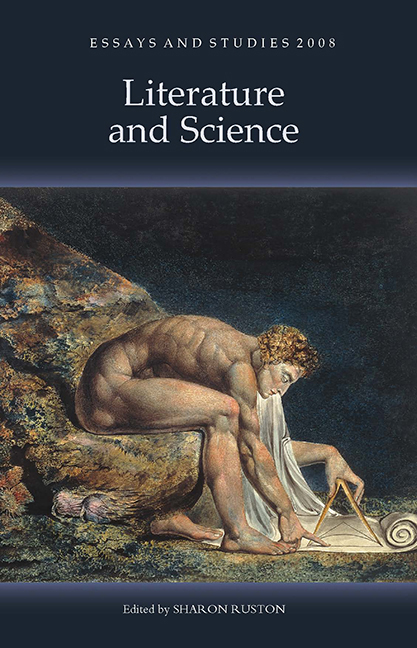Book contents
- Frontmatter
- Contents
- List of Illustrations
- Acknowledgements
- Notes on Contributors
- Introduction
- 1 From Popular Science To Contemplation: The Clouds Of The Cloud Of Unknowing
- 2 ‘Dreams And Plain Dotage’: The Value Of The Birth Of Mankind (1540–1654)
- 3 Natural Rights And Natural History In Anna Barbauld And Mary Wollstonecraft
- 4 George Eliot, Geometry And Gender
- 5 On The Back Of The Light Waves: Novel Possibilities In The ‘Fourth Dimension’
- 6 Le Fanu's ‘Carmilla’, Ireland, And Diseased Vision
- 7 Evolution, Literary History And Science Fiction
- 8 ‘The Luxury Of Storytelling’: Science, Literature And Cultural Contest In Ian Mcewan's Narrative Practice
- Index
8 - ‘The Luxury Of Storytelling’: Science, Literature And Cultural Contest In Ian Mcewan's Narrative Practice
Published online by Cambridge University Press: 12 February 2019
- Frontmatter
- Contents
- List of Illustrations
- Acknowledgements
- Notes on Contributors
- Introduction
- 1 From Popular Science To Contemplation: The Clouds Of The Cloud Of Unknowing
- 2 ‘Dreams And Plain Dotage’: The Value Of The Birth Of Mankind (1540–1654)
- 3 Natural Rights And Natural History In Anna Barbauld And Mary Wollstonecraft
- 4 George Eliot, Geometry And Gender
- 5 On The Back Of The Light Waves: Novel Possibilities In The ‘Fourth Dimension’
- 6 Le Fanu's ‘Carmilla’, Ireland, And Diseased Vision
- 7 Evolution, Literary History And Science Fiction
- 8 ‘The Luxury Of Storytelling’: Science, Literature And Cultural Contest In Ian Mcewan's Narrative Practice
- Index
Summary
IN IANMCEWAN's Enduring Love, Joe Rose, the narrator of the story and a science journalist by profession, undertakes some research towards his next project, about ‘the death of anecdote and narrative in science’ (McEwan 1998, 41). In doing this, he ventures to the London Library, a place that the philosopher of neo-Darwinism, Daniel C. Dennett, might refer to as a branch of ‘the library of Babel’. Rose is more at home in the harder edged world of Babel's analogue and antithesis – what Dennett referred to as ‘the library of Mendel’, or the DNA holdings of letter sequences, codes and ‘paragraphs’ that compose the genomic templates organizing life. Rose despises the Victorian London Library for the paucity of its scientific collections, and bemoans the library's ‘assumption… that the world could be sufficiently understood through fictions, histories and biographies. Did the scientific illiterates who ran this place, and who dared to call themselves educated individuals, really believe that literature was the greatest intellectual achievement of our civilisation?’ (42). The question of literature's role in generating and enhancing ‘civilization’ remains, for intellectuals trained in science, a contested one.
Rose's purpose is to locate scientific writing on the edge of extinction: he peruses a key nineteenth-century source of scientific inquiry and debate, the journal Nature, established by T. H. Huxley in the late 1860s. The narrator locates an anecdote from a correspondent about a dog which appears, through its actions in relation to its human masters, to display some strikingly human traits: having been ordered off its favourite spot, it seems to dupe its master into a course of action that permits the dog to return, triumphantly, to the spot from which it has been removed: for the correspondent of 1904 this demonstrates canine memory, foresight and cunning. Of course, to the modern scientific journalist this merely represents a tendency of thought among ‘Darwin's generation’ which ‘was the last to permit itself the luxury of storytelling in published articles’. What draws the narrator's attention to this anecdote is ‘how the power and attractions of narrative had clouded judgment … No theory evinced, no terms defined, a meaningless sample of one, a laughable anthropomorphism’ (41). As this chapter will argue, narrative in science is far from dead.
- Type
- Chapter
- Information
- Literature and Science , pp. 151 - 168Publisher: Boydell & BrewerPrint publication year: 2008
- 2
- Cited by



